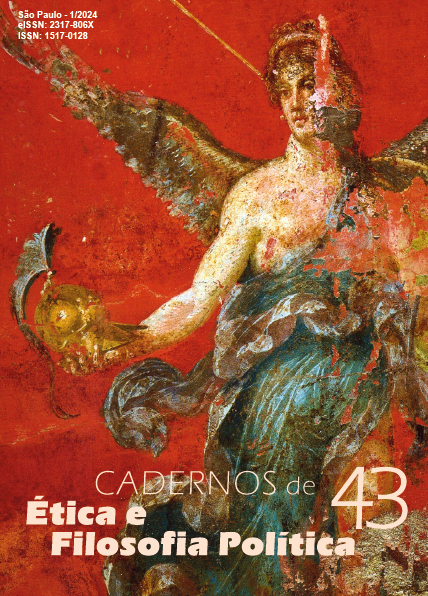Republican institutions in Machiavelli’s: the case of public accusations
DOI:
https://doi.org/10.11606/issn.1517-0128.v43i1p51-65Keywords:
Republic, Freedom, Accusations, Slander, StabilityAbstract
This article discusses the issue of public accusations and slander in Machiavelli’s Discorsi. It is argued that the ordering of public prosecution strengthened control over social conflicts that could be harmful to the exercise of civil freedom. This institution prevented dissensions between the plebs and the nobility from resulting in social disorders that could make the body politic sick. It describes the role of public accusations and how slander could interfere with the stability of the republic. The analysis was guided by the reading of chapters 7 and 8 of book I of Discorsi. In Rome, acussations resulted in punishment and slander was controlled, un like what happened in Florence, Machiavelli’s hometown.
Downloads
References
AMES, José Luiz. “O papel constituinte dos conflitos em Maquiavel”. In: Síntese, Belo Horizonte, v. 46, n. 145, pp. 255-281, Mai./Ago., 2019.
AMES, José Luiz. “Povo e governo: sobre a questão da participação popular em Maquiavel”. In: Philosophos, Goiânia, v. 24, n. 1, pp. 102-128, Jan./Jun. 2019.
BIGNOTTO, Newton. Maquiavel republicano. São Paulo: Loyola, 1991.
BIGNOTTO, Newton. Republicanismo e realismo: um perfil de Francesco Guicciardini. Belo Horizonte: Editora UFMG, 2006.
GAILLE-NIKODIMOV, Marie. Conflit civil et liberté: la politique machiavélienne entre histoire et médecine. Paris: Edition Honoré Champion, 2004.
LEFORT, Claude. “Maquiavelo y la veritá effetuale”. In: El arte de escribir y lo político. Barcelona: Herder Editorial. 2007.
MAQUIAVEL, Nicolau. Discursos sobre a primeira década de Tito Lívio. São Paulo: Martins Fontes, 2007.
MAQUIAVEL, Nicolau. O príncipe. Edição bilingue. Tradução de Digo Pires Aurélio. São Paulo: Editora 34, 2017.
MCCORMICK, John P. “Machiavelli against republicanism on the Cambridge School’s ‘Guicciardini Moments’”. In: Political Theory, v. 31, n. 5, pp. 615-643, october 2003.
MCCORMICK, John P. “Democracia maquiaveliana: controlando as elites com um populismo feroz”. In: Revista Brasileira de Ciência Política, v. 12, pp. 253-298, 2013.
MCCORMICK, John P. “Of tribunes anda tyrants: Machiavelli’s legal and extra-legal modes for controlling elites”. In: Ratio Juris. v. 28, n. 2, pp. 252-298, june 2015.
POCOCK, John. El momento maquiavélico: El pensamiento político florentino y la tradición republicana atlántica. Madrid: Editorial Tecnos, 2002.
SILVA, Ricardo. “Da honra ao patrimônio: conflito social e instituições políticas nos Discorsi de Maquiavel”. In: Revista Brasileira de Ciência Política, v. 12, pp. 43-66, 2013.
SILVA, Ricardo. “Visões da liberdade: republicanismo e liberalismo no debate teórico contemporâneo”. In: Lua Nova, São Paulo, v. 94, pp. 181-215, 2015.
SKINNER, Quentin. As fundações do pensamento político moderno. São Paulo: Companhia das letras, 1996.
VERGARA, Camila. “Populism: plebeian power against oligarchy”. In: ARVIDSSON, Matilda; (et al.) (org.). Constituent power: law, popular rule and politics. Edinburgh: Edinburgh University Press, pp. 183-198, 2020.
Downloads
Published
Issue
Section
License
Copyright (c) 2024 Miquéias Serrão Marques

This work is licensed under a Creative Commons Attribution-ShareAlike 4.0 International License.


